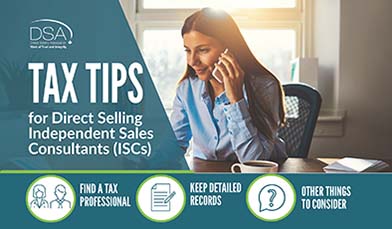As an independent sales consultant (ISC), you operate your own small business. Along with this amazing opportunity comes the need to manage your tax responsibilities professionally. Here are some tips to help you make informed decisions at tax time and throughout the year.
Find a Tax Professional
Seek out a tax professional that is right for you – this could be an independent advisor, an accounting firm or an online tax service.
- Ask for referrals from other ISCs in your region.
- Ask potential advisors about their knowledge of the direct selling channel and home-based businesses.
- Find help that suits your required comfort level – for example, some advisors will be more aggressive in claiming deductions.
- Tax advisors should take an interest in helping your business, beyond just filing a tax return – including offering helpful tips and advice.
- Trust is important. The tax return will be submitted in your name and you will be required to repay any items that are over-claimed.
Keep Detailed Records
Accurate and detailed record keeping is crucial. Records should be kept for at least seven years.
Earnings & Purchases: Your parent company may be able to provide you with a transaction report for the year.
General Expenses & Receipts: Keep a diary of all expenses and save your receipts, making clear notes of their purpose.
Events, Trips & Conferences: To support claims for business components of trips and conferences, keep a copy of business meeting agendas, noting key dates and times.
Vehicle Mileage: Keep a log and track each business trip.
Business Meals: Record who each business meal was with and what was discussed.
Education & Training: Document costs for courses that helped build your business skills.
Marketing & Samples: Note expenses tied to promoting your business, including events, advertising, printing and demonstration products.
Inventory: Perform an inventory count at year end.
Other Things to Consider
- Is what you do a hobby or a business?
- What deductions can you claim for home office space and home business expenses?
- Do you need to register for a GST/HST number?
- Are the benefits (e.g. trips, gifts) that you receive taxable?
- What are the appropriate filing and payment deadlines?
Download the bilingual pdf (939 KB)
This list is not exhaustive and is only intended to cover general areas of interest. It is not a substitute for professional advice. DSA Canada cannot be held liable for the information included in this document or actions taken, or not taken, as a result of it.
Updated April 27, 2021.


